|
I hope you are getting excited about our online launch date: Saturday, July 9th, 2016 at 2 pm! (On Facebook and at First Marietta, in Marietta, Georgia) Please watch the video and find out what you will need. All three items are extremely important to the process. I want to also stress, this should be a process that includes all ages. I think when it comes to worship we become very selective regarding who are the ones planning it. Like, if we don't include youth in this process than the youth will never feel comfortable with the outcome. Watch the video and find out what you need! There it is! Three items.
If you are participating, please fill out the form on our upcoming events page. (Or become a member or associate member.) Either way, it will keep you up to date with what we are doing.
For most of us the prayer in Gethsemane is the only model. Removing mountains can wait.
From Letters to Malcolm: Chiefly on Prayer 20 Early in the morning, as Jesus and his disciples were walking along, they saw the fig tree withered from the root up. 21 Peter remembered and said to Jesus, “Rabbi, look how the fig tree you cursed has dried up.” 22 Jesus responded to them, “Have faith in God! 23 I assure you that whoever says to this mountain, ‘Be lifted up and thrown into the sea’—and doesn’t waver but believes that what is said will really happen—it will happen. 24 Therefore I say to you, whatever you pray and ask for, believe that you will receive it, and it will be so for you. Mark 11:20-24 CEB
I believe, after July 8th, there will be a written meditation on Thursday, and the livecast on Saturday.
This will mean we will have Monday Prayer on our Subreddit, Thursday Meditations here, and Casting the event Saturday on Facebook. This coming Thursday: I will tell you the different objects I need you to collect for our livecast, whether you will physically be there, or watch online!
If you wish to donate, we have a donate button at the top.
If you wish to connect, follow one of the below links: Our Subreddit on Reddit Our Facebook Page Our Pinterest Page Our Twitter Feed Each of these links are different, and different content happens on each. True, usually I share the meditation on all of them, but that's just a piece of what those links are. I invite you to check them out! 4 The one who claims, “I know him,” while not keeping his commandments, is a liar, and the truth is not in this person. 5 But the love of God is truly perfected in whoever keeps his word. This is how we know we are in him. 6 The one who claims to remain in him ought to live in the same way as he lived. 2 John 1:4-6 CEB -Brandon William Peach- If you were asked where you fall on the spectrum articulated by Lewis above, a continuum that exists between “Wise, Kind, Beautiful” and “Stupid, Disagreeable,” where would you place yourself? I know where I’d place myself, and I suspect that most people feel the same. Even in a culture that espouses “first learn to love yourself” as some sort of affirmational prerequisite for loving others, my gut tells me that most of us end up on the opposite half of the spectrum. Stupid. Disagreeable. “Wise, Kind, Beautiful” and “Stupid, Disagreeable” are extremes - very few people would accept one of these definers as absolutely true all the time. But on this spectrum, this continuum, I would wager that more people find themselves in negative territory more often than in the positive. Because “love” can seem paradoxically so complex and yet so easily manipulated into a simple, sugarsweet notion, let’s turn to Scripture. The Second Epistle of John is believed by many Christians to have been written by John the Apostle, who was exiled to Patmos - referred to often in the Gospels as the “Disciple Whom Jesus Loved.” It’s appropriate, then, that he speaks to the recipient of his letter (“Dear Lady”) about love: “It has given me great joy to find some of your children walking in the truth, just as the Father commanded us. And now, dear lady, I am not writing you a new command but one we have had from the beginning. I ask that we love one another. And this is love: that we walk in obedience to his commands. As you have heard from the beginning, his command is that you walk in love.” 2 John 1:4-6 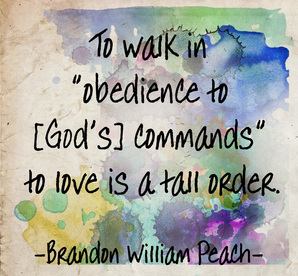 To walk in “obedience to [God’s] commands” to love is a tall order. Because, as Lewis explains in his above letter, God loves us not because we are particularly lovable, but because He delights in giving love to us. And in the very same way, He desires - commands - for us to love one another. This type of love is perhaps the defining characteristic of our God, expounded upon endlessly in Christ’s admonishments to love one another, our neighbor, our enemy, the same way that God loves us; that is, delighting to give love. The New Testament is rife with references to, proclamations of, this love. In John’s first epistle, referenced by Lewis in his letter to Van Deusen, he doesn’t say merely that God loves, or that God is like love, or that God gives love. He says “God is love.” The two are synonymous - without God, love cannot exist. Without love, God mustn’t. Scripture makes it clear that God loves us in spite of everything about us that’s frankly unlovable. And then He charges us to do the same. Back to the spectrum I mentioned - the continuum that exists between “Wise, Kind, Beautiful” and “Stupid, Disagreeable” - please take a moment to think again where you placed yourself and why. Do you believe that no matter where you fall on that spectrum, you’re still loved recklessly and wildly and amazingly and beautifully? Do you believe that God loves you when you feel He shouldn’t? The incredible theologian Fred Rogers (and no, I’m not being hyperbolic), said in a 2003 documentary, 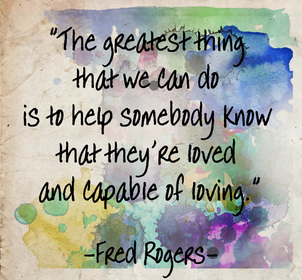 “The greatest thing that we can do is to help somebody know that they're loved and capable of loving.” As a bit of background, I often feel unlovable. I feel like I’m a letdown to my wife and my two-year-old son. This is perhaps due to the fact that I’m a sufferer of major depressive disorder, and lies creep in a lot easier than truth. But to combat the lies, we have to accept the truth - no matter where we see ourselves on the spectrum, we must anchor ourselves in the fact that we are loved intensely by a God who looks past our imperfections. You are loved. I am loved. And not just by God, but critically by those who are enacting love in the very example of our God. According to biblical scholars, when John says he finds “some of your children walking in truth,” he’s not implying that the other children aren’t. Rather, he has been specifically acquainted with some in the Church who have committed to loving others in the radical and undiscriminating way that God loves. When we’ve accepted that we truly are loved, as Mr Rogers suggested, and that that love doesn’t go away when we feel stupid or disagreeable or undeserving or even desperate, we learn that we’re capable of loving. When we know that God loves us just as we are, we have the freedom to love others just as they are.  The cornerstone of the Gospel - that God so loved the (ugly, sinful, evil, hateful, ignorant, unlovable) world. He loved it so much that he literally condescended to live among it and die an unthinkable at its hand. To our God, it was worth it. When you accept that love and grab onto it and claim it as true, when you can proclaim within your heart that I AM LOVED, you’re doing so much more than “loving yourself.” You’re accepting the supreme Example of love. “God loves us,” Lewis concludes, “not because we are lovable but because He is love, not because He needs to receive but He delights to give." May we delight in giving love - the divine love that those undeserving need most. Brandon William Peach is a writer whose day job in a marketing firm pays the bills. His favorite thing in the world is spending time with his wife Kathleen and his two-year-old son William. Brandon's interests include literature, music, film, religion, and philosophy.You can friend or follow him at facebook.com/brandonwpeach, or read his infrequent tweets at twitter.com/brandonpeach. Wanna connect with others? Join Fig Tree on:
Our Subreddit Come to Facebook on Tuesday, at 8pm EST. Rev. Melissa will be livecasting an important message. The Lord’s voice is over the waters; the glorious God thunders; the Lord is over the mighty waters. The Lord’s voice is strong; the Lord’s voice is majestic. The Lord’s voice breaks cedar trees-- yes, the Lord shatters the cedars of Lebanon Excerpt from Psalm 29 -Adam Thrash- “The Gifts of God for the People of God. Take them in remembrance that Christ died for you, and feed on him in your hearts by faith, with thanksgiving.” These are the words that are spoken each Sunday at my church before the congregation receives communion. It’s these words that remind us, as we consume the elements of communion, to remember our Lord who died for us and to take spiritual nourishment from this reminder. The incarnation of Jesus and our invitation to remember it in communion are both gifts from God to his people. And these gifts are nothing to scoff at, for in the incarnation of Christ, God has opened the way to eternal life and reconciliation with him. We thank God for the incarnation and our salvation through the death and resurrection of Christ when we participate in the Eucharist (literally “thanksgiving”). However, what if we did more than be thankful for the gifts of God? What if we instead examined the kind of God who gives such gifts? What would we learn about God in doing that? In examining these gifts that God has given us, we learn much about what kind of God he is, and how much we mean to him. We learn that he is a God who loves his creation and desires to reconcile all people to himself. We learn that God values us so much that he loved us even when we did not love him and that he came for us regardless. We learn that God loves us in a way that gives without consideration of cost to himself. During Communion, we are invited to reflect on this deep love that God has for us and be grateful for it, as well as to understand that a God who loves us like that wants us to love others in the same way. 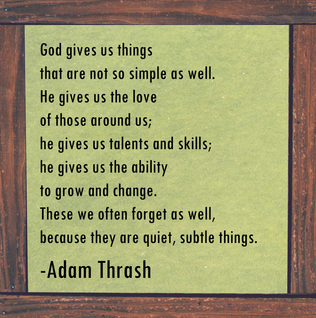 God gives us other things as well. Some things seem simple - God gives us sunshine and rain; God gives us winter and summer; God gives us an earth and sky. We often take these things for granted because they are so present in our lives. God gives us things that are not so simple as well. He gives us the love of those around us; he gives us talents and skills; he gives us the ability to grow and change. These we often forget as well, because they are quiet, subtle things. By these things we learn of a God who desires that his creation be ordered and sustained and full of wonder. We learn that God desires people to have communities because he has created us to be social, that he desires us to work and create because he has given us the skills and talent to do so, and that he desires to see us grow more and more into the image of Jesus because he has made a way for us to do that too. If we were to examine the quality of things that God gives us, we would be doing exactly what God wants us to do, for in giving to us, God wants to subtly bring our thoughts to him. Any moment at which we thank God for something is also an opportunity to “Give to the Lord the glory due his name.” Any moment like this is a small moment for worshiping God as we see what a holy and good God he is. These are the moments that teach us to pray without ceasing. When the generosity of a friend or a beautiful sunset cause us to pause for a moment and reflect on the God that gave us those things, we have become to let our mind rest on the one who gave us the gift. When we start to recognize the Giver, then we start to recognize things from God that were previously given gifts we didn’t notice. We start to see those sunbeams mentioned by C.S. Lewis in other places in our life, until our lives look like daylight as we can give thanks to God for all things in our lives. Adam Thrash is a bioinformatics researcher by day and a theologian by night. He is a member of the Episcopal Church and is on track to start the process of discernment for ministry. You can read more from him and see pictures of his cat at his newest project, Theology & Cats, and you can follow him on Twitter at @adam_thrash. “Jacob looked up and there was Esau, coming with his four hundred men; so he divided the children among Leah, Rachel and the two female servants. 2 He put the female servants and their children in front, Leah and her children next, and Rachel and Joseph in the rear. 3 He himself went on ahead and bowed down to the ground seven times as he approached his brother. 4 But Esau ran to meet Jacob and embraced him; he threw his arms around his neck and kissed him. And they wept.” Genesis 33:1-4 -Jake Ritter- As a man named after the Prophet Jacob, I’ve always been tempted to read this from his perspective, but this particular passage isn’t really about Jacob; it’s about Esau. Esau (literally “the hairy”) was the first born of Rebekah’s twin sons, and therefore the rightful heir to Isaac’s birthright: the physical land of Israel and the heavenly Covenant with God. Partly out of knowing that he had a birthright to fall back on, partly because of his own inclinations, he turned to a comparatively risky profession of hunting, as opposed to Jacob (literally “the usurper”), who took up shepherding. Hunting, then as now, was a seasonal profession, and there are times when there simply is no game to hunt. Jacob, as we all know, capitalized on just such a time in order to get consent to steal Esau’s birthright, the only security, earthly or otherwise, he could rely on, and then went on to trick their father into passing it to him. And what do men do, now as in any other time throughout human history, when they have nothing to lose and their only skills are sneaking up on things and killing them? Esau became a bandit, and later a warlord, settling the land of Edom and his descendants following in his footsteps making war on everyone around them, including Israel.  So when we see Esau “coming with his four hundred men,” this is why. He always had his 400 men, because his new life, which Jacob put him in, required it. But here is where the story turns: Esau was faced with the very real possibility of simply killing Jacob, taking back his birthright, and returning to his rightful place as Isaac’s heir, becoming the master of both worlds in the process. This is literally the same plot as the Lion King: the hero is betrayed and exiled in a moment of weakness, learns a new way of life in the outside world, and returns with his new skills to take back what is rightfully his. If we anticipated violence out of Simba and thought of it as righteous, we expect it also of Esau. But herein lies the lesson that God teaches us through Esau: letting go of the wrongs of the past is the way to follow God. Just as the father of the prodigal son ran to meet him, Esau did not hesitate or deliberate before meeting Jacob, “But Esau ran to meet Jacob and embraced him; he threw his arms around his neck and kissed him.” I dare say he might have even put a ring on his finger and killed a fatted calf, if he’d had them, but it seems Esau was still at least financially recovering, even then, from the loss Jacob had dealt him. To us as readers, this doesn’t meet our expectations. Surely Esau deserves redemption, he deserves restitution, he deserves his revenge and the rightful return to his previous place of honor after being wronged by Jacob. This is why, to our ears, it is easier for us to focus on Jacob serendipitously making amends with his brother, who is given no second thought. It fits better with our ideas of human justice. We all want to be Jacob in this situation, but if we are honest in our moral self-examination, we are Esau. We are the ones who are arrogant and impulsive, who are wronged in life in one way or another, and are given ample opportunities to hold grudges, to seek revenge, and dress it up in moralistic language by calling it redemption. In our culture the very meaning of forgiveness is warped into a lie we tell ourselves and others, acting as though the sin committed against us never happened, or that it didn’t actually hurt, or that we have fully recovered in order to continue existing amicably with everyone except the person we hold a grudge against. It is a shrunken, impoverished idea of what forgiveness means compared to the Christian ideal. The Christian sense of the word is finding it in ourselves to wish for God’s salvation to be extended to that person. As is in the morning prayers customary for my church: 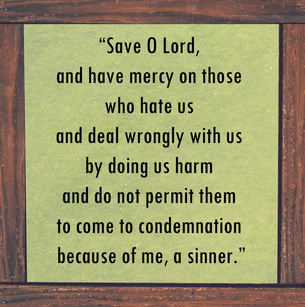 “Save O Lord, and have mercy on those who hate us and deal wrongly with us by doing us harm and do not permit them to come to condemnation because of me, a sinner.” Put bluntly: if God were to bring this person into heaven, would we be angered about it? Would we feel that God’s grace was wrongly extended to that person? If we can answer these questions in the negative, we have crossed the bridge of Christian forgiveness. This, somewhat paradoxically, sets the bar much lower and much higher for forgiveness than our culture is ready to allow. Christians of all stripes love to talk about being counter-cultural, but this is where the tires universally meet the pavement on the road to Christ. C.S. Lewis, a favorite of seemingly all Christians since the 1940’s, came to a similar conclusion, evidenced in many of his works on the subject: “Last week, while at prayer, I suddenly discovered- or felt as if I did- that I had really forgiven someone I have been trying to forgive for over thirty years. Trying and praying that I might. When the thing actually happened- sudden as the longed-for cessation of one's neighbor's radio- my feeling was "But this is so easy. Why didn't you do it ages ago?"” Becoming angry is not something we do consciously. It builds on its own, gathers power over us, and festers in us almost entirely outside the realm of thought. It is an involuntary reaction to wrongdoing in the same way our knees kick when tapped the right way at the doctor’s office. Anger and pride happen to us, just like the things that hurt us do. By the time we get to assigning words to it, we have already failed at curbing that reflex, and simply try to recount what happened, like a bystander recounting the details of a car accident. Pushing back against that becomes difficult only after we have reinforced it with our thoughts, and the thoughts themselves, when made conscious, are simply irrational. Every time we are wronged or offended and we take it to heart, some variation of this thought goes through our minds: “How dare that person do that thing to me?”. When spoken, it’s fairly obvious egoism, telling us nothing about what happened, and everything about what the speaker thinks of herself. But because the urge of anger goes past us without speaking, it bypasses our intellects, and it bypasses out will. We no longer think about what we’re doing, nor do we even do things we actually want to do: we just act, because we are angry. As westerners, we are quite accustomed to acting in this way. There are dozens of industries designed to play at our emotions, and get us to act on them before we think about it. Drug commercials play at our fear of illness, the fashion industry plays at our fear of rejection, and most of our entertainment industries play at our fears for the sake of enjoyment. These aren’t inherently sinful, but they are directed toward encouraging you and me to focus on worldly things, and that encouragement is constant: feel, then act, then feel, then act. Thinking is not necessary. But a lot of life is made clear when it is made conscious and thoughtful, rather than impulsive and action oriented.  “How dare THAT PERSON,” is, at least in my experience, never a person whom I hold to be more worthy of respect than I am, at least in my opinion. “That person” is always someone lower than us, or indebted to us, or if they are close to us, the relationship is one in which we think of ourselves as the more important member. Is this not pretty cut and dry egoism talking? Is that not inimical to the attitude of humility Christ calls us to imitate? “How dare that person do THAT THING,” is likewise almost always an action that is somehow unworthy of being done in your presence, let alone to you personally. But is that what Christ promised us? That there were set lower limits to the kind of evils that we would endure, or that following him would somehow leave us with certain maladies which would be put far away from us? When we talk about trials in life as tests, it’s tempting to think of the trials themselves as tests of our strength, when in reality it’s a test of our commitment to abandoning the delusion that there are good things in life that we deserve and bad things in life that we do not. “To ME?” lastly, in my experience, is almost always a morally unassailable person who never deserves only praise and adoration, at least in that instant. Again, as this thought slips in and out of our minds in that moment of taking offense, this statement alone is tantamount to denying that basic reality that we are sinners, and that it is when things go well for us, not when they become difficult, that cosmic justice is somehow perverted. Taking a hard look at this fleeting thought that we indulge even at the moment of taking offense at a wrongdoing, rightly or wrongly, it is no wonder that the early Church spoke at length about how the Devil uses the passions to draw us away from God. As modern Christians it’s easy to talk about how we’ve moved beyond images of goat-hooved men with pitchforks tempting us with thinly veiled allegories, but the fact remains the same: indulging this thought is itself poisonous to our relationship with God, no matter where we think it comes from. And it is no secret that our culture, fueled by consumerism and a bastardized version of Protestant ethics, encourages us to value others as of secondary importance to ourselves, to seek vengeance in the guise of redemption, and to value ourselves highly, in order to “get ahead in life.” The more we are subconsciously allied with this line of thought, the more difficult a momentous a task real forgiveness becomes.  Forgiveness is and can be easy if we let go of this idea of ourselves as morally unassailable, superior to others, and fit only for things we naturally appreciate. Prayer helps us mentally slow down and decide which actions we will take and which thoughts we will indulge. These, by contrast, are intentional acts. Setting aside our anger and resentment towards others is an act of will, much more than coercing someone into apologizing. It is a step towards mastery of one’s own world, not a sign of weakness or passivity. And this is one of the most crucial points of Christianity: we are never more fully ourselves than when we submit ourselves to God. After forgiving Jacob, Esau becomes Edom (literally “the human one”). By practicing it ourselves, we exercise our wills, instead of our animal instincts. We, in turn, stop being animals and start being truly human when we allow ourselves to set aside our irrational pride, to pray for the salvation of others, and to follow God. And we do that through forgiveness. Jake Ritter is a sinner, a scholar, and a recent convert to Orthodoxy. He lives in Charlottesville, Virginia and works as a data analyst. In his spare time he reads books on theology, history, sociology, and economics. You can friend him on facebook at www.facebook.com/jake.r1tter. |
Categories
All
Archives
October 2023
|



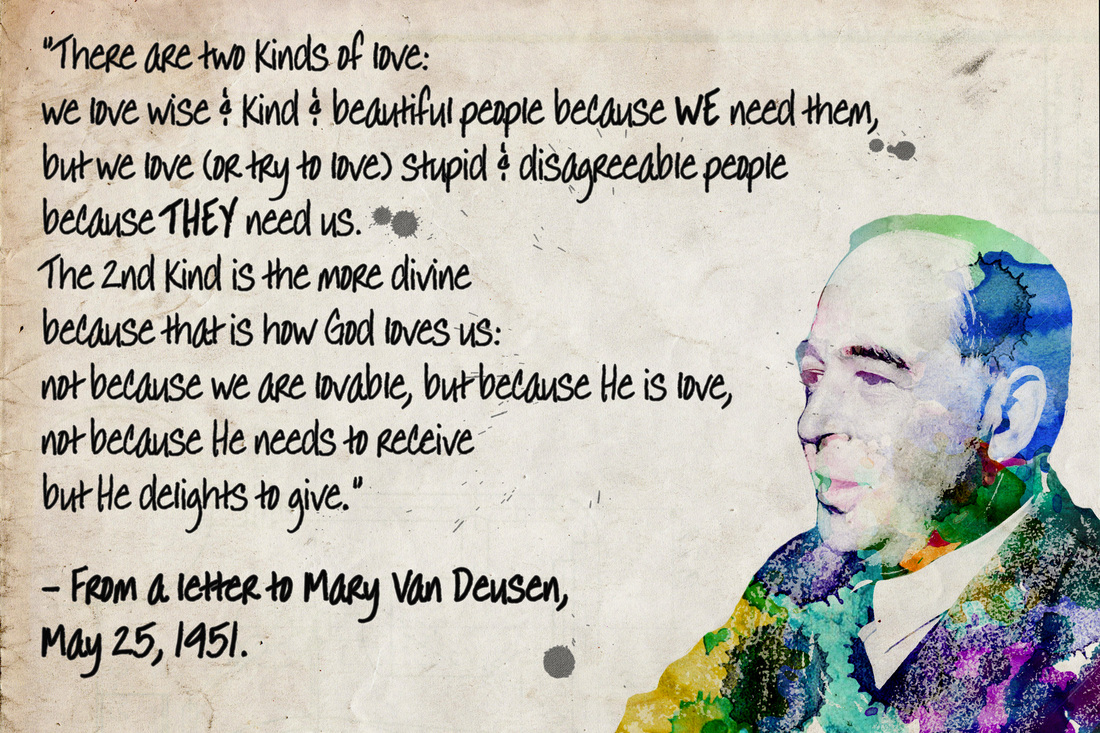
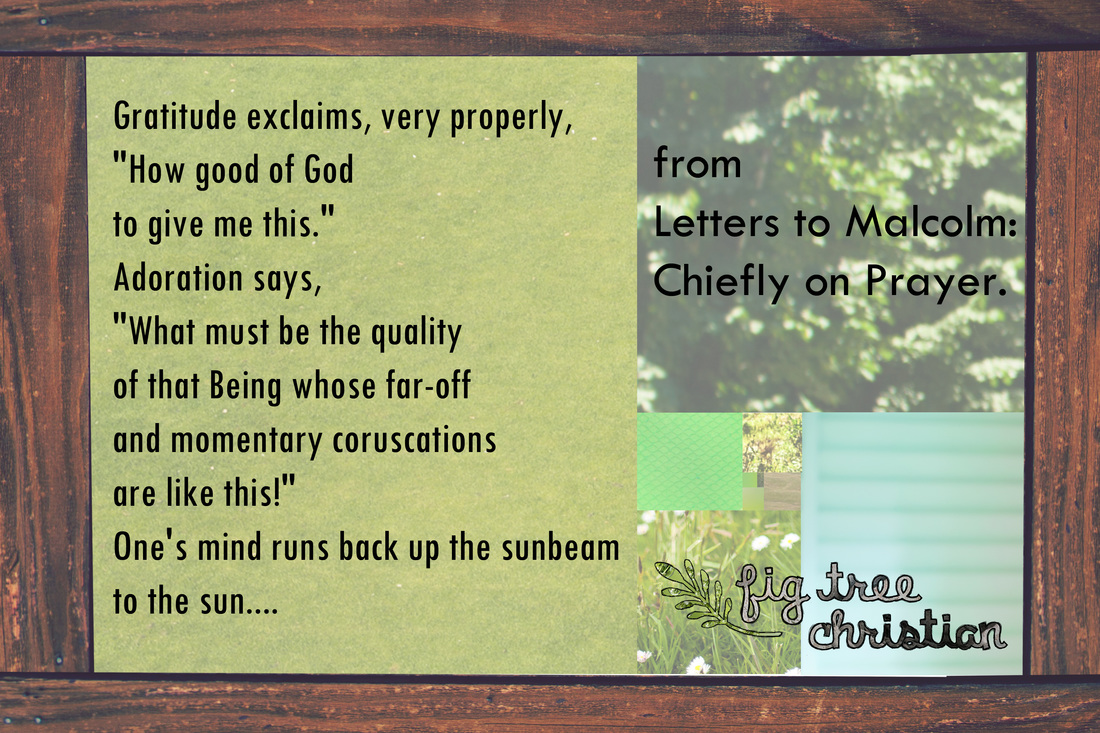
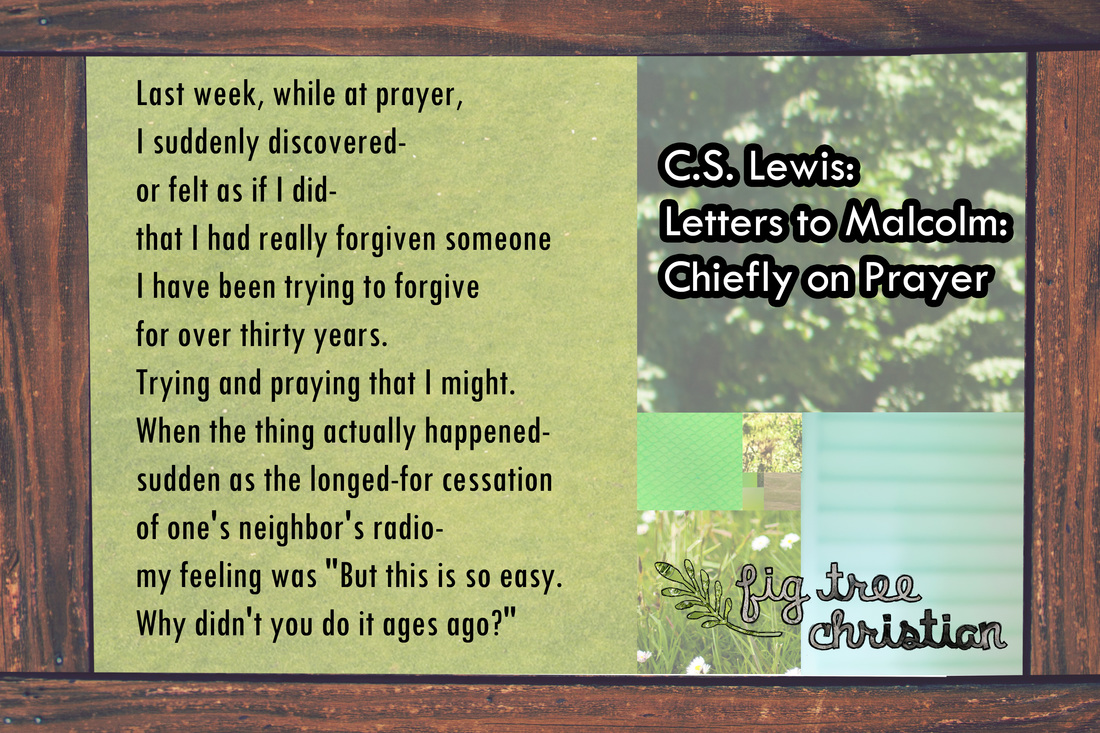

 RSS Feed
RSS Feed